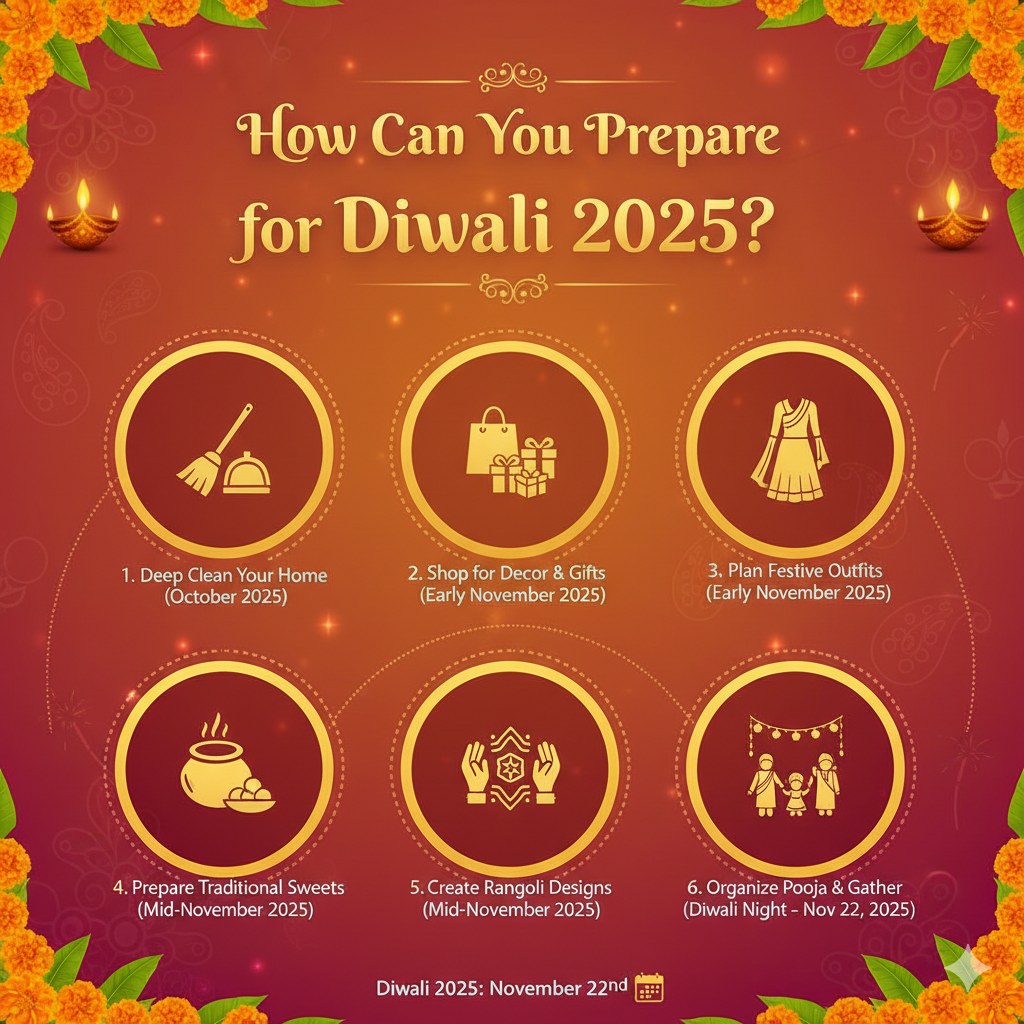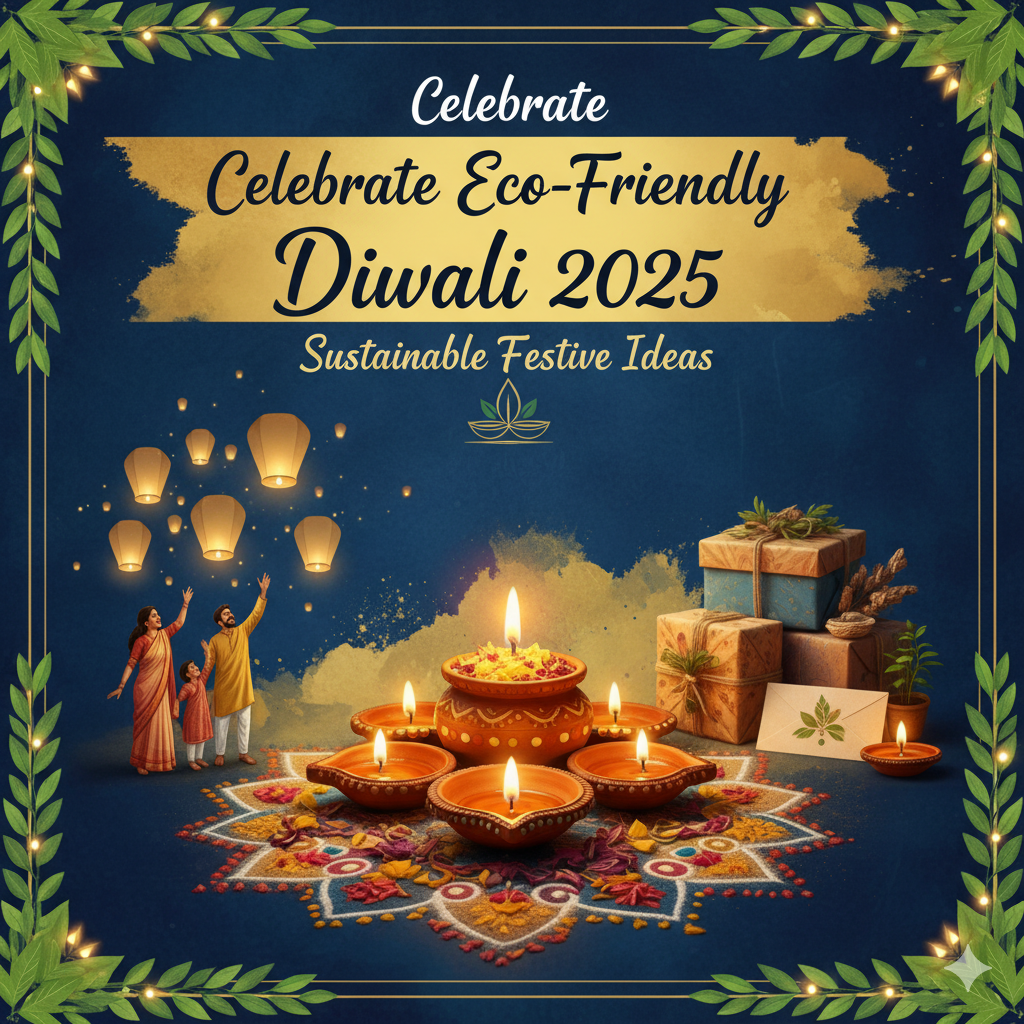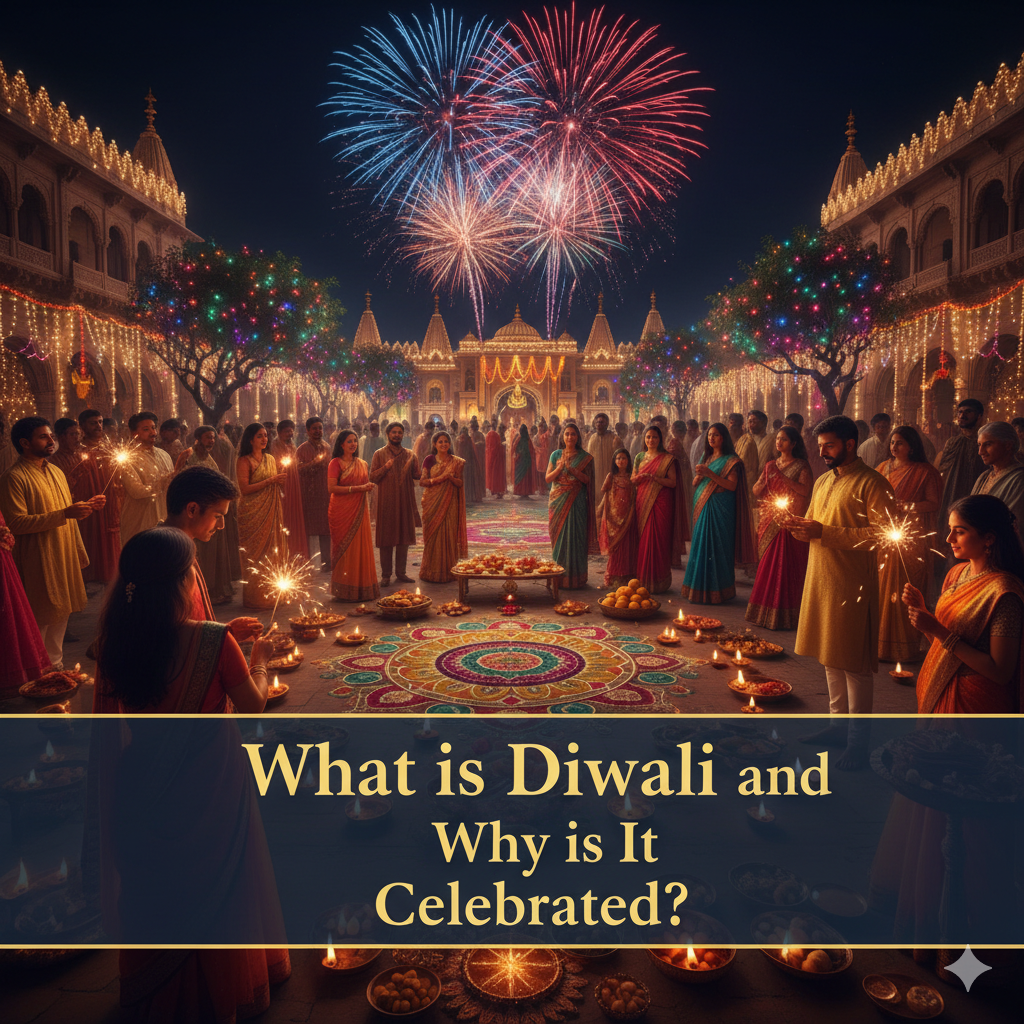Diwali 2025 is just around the corner, set to illuminate homes and hearts on October 20, 2025. This year, the festival is especially meaningful as it brings together a rich tapestry of traditions that unfold over five vibrant days. The celebrations begin with Dhanteras, a day dedicated to wealth and prosperity, where people buy gold, silver, and new utensils to invite good fortune. The following days include Choti Diwali, Naraka Chaturdashi, and the highly revered Lakshmi Puja night, the main day of Diwali, when homes sparkle with rows of diyas and families perform worship to invite blessings from Goddess Lakshmi and Lord Ganesha.
Diwali’s joyous energy extends beyond households into communities with cultural programs, fairs, and temple ceremonies enriching the festive mood. You can celebrate by decorating with colorful rangoli, lighting traditional diyas and lanterns, exchanging thoughtful gifts, and preparing delicious sweets and snacks to share with loved ones. While fireworks light up the night sky in many regions, eco-friendly alternatives are gaining popularity to honor environmental responsibilities.
Whether through spiritual rituals, family bonding, or community festivities, Diwali 2025 is a beautiful occasion to embrace hope, prosperity, and the triumph of light over darkness in a warm, inclusive way.
What is Diwali and Why is it Celebrated?
Diwali, also called Deepavali, is often known as the Festival of Lights and is one of the most vibrant and widely celebrated Hindu festivals, observed by millions not only in India but around the world. It marks the triumph of good over evil, light over darkness, and knowledge over ignorance. The festival’s essence is deeply spiritual, cultural, and historical, making it a colorful and meaningful celebration for families and communities alike.
The origins of Diwali trace back to ancient India, with mentions in classical Sanskrit texts like the Padma Purana and Skanda Purana dating between the 7th and 10th centuries. Its roots are thought to be a fusion of traditional harvest festivals combined with spiritual lore emphasizing the victory of righteousness, or Dharma, over unrighteousness, or Adharma. The name “Deepavali” itself means “row of lights” in Sanskrit, symbolizing the lamps (diyas) lit during the festival to illuminate homes and streets, representing the inner light that dispels spiritual darkness.
When Does Diwali 2025 Begin and End?
Diwali 2025 officially begins on October 18 with Dhanteras and concludes on October 23 with Bhai Dooj, marking five days of vibrant celebrations filled with spiritual significance and joyful customs. The festival starts on Dhanteras, a day dedicated to worshipping Lord Dhanvantari and Goddess Lakshmi, where buying gold, silver, or utensils is considered auspicious to welcome prosperity into homes.
The second day, Naraka Chaturdashi or Choti Diwali (October 19), involves cleansing rituals and symbolizes Lord Krishna’s victory over the demon Narakasura, representing the removal of inner darkness. The main day, Diwali or Lakshmi Puja, falls on October 20. This is the most important occasion when families gather for Lakshmi Puja in the evening to worship Goddess Lakshmi, the deity of wealth, along with Lord Ganesha and Lord Kuber. Diyas are lit to usher in light and positivity during the auspicious muhurat, typically between 7:00 PM and 8:30 PM.
Following Diwali, Govardhan Puja on October 22 celebrates Lord Krishna’s protection of the people, marked by grand food offerings. Finally, Bhai Dooj on October 23 honors the bond between siblings with prayers and gift exchanges. Each day’s unique rituals emphasize joy, family unity, and the spiritual triumph of light over darkness.
What Are the Five Days of Diwali 2025?
Dhanteras (October 18, 2025): The festival starts with Dhanteras, dedicated to Goddess Lakshmi and Lord Dhanvantari, the god of health and wealth. Buying precious metals and new utensils is considered auspicious.
Naraka Chaturdashi or Choti Diwali (October 19, 2025): This day celebrates Lord Krishna’s victory over demon Narakasura. Many take ritualistic baths and light lamps to welcome purity.
Lakshmi Puja or Main Diwali Night (October 20, 2025): The most important day when goddess Lakshmi and Lord Ganesha are worshipped in the evening. The ritual includes lighting diyas, setting off crackers, and adorning homes with rangoli and lights.
Govardhan Puja (October 22, 2025): Celebrates Lord Krishna’s protection of villagers by lifting Govardhan hill. Families prepare grand food offerings called Annakut or mountain of food.
Bhai Dooj (October 23, 2025): Celebrates the bond between brothers and sisters, with sisters praying for the long life and well-being of their brothers.
How Can You Prepare for Diwali 2025?

Preparing for Diwali 2025 is a heartwarming process that goes beyond just buying gifts and lights—it’s about cultivating an atmosphere filled with joy, prosperity, and spiritual harmony. The first step is thorough cleaning of your home because cleanliness is believed to attract positive energy and good fortune. Once cleaned, decorate your home with traditional rangoli designs crafted from vibrant powdered colors at entrances, string colorful fairy lights, and place diya lamps around the house to brighten every corner. These lamps symbolize the triumph of light over darkness.
Shopping is an important part of Diwali preparation. On Dhanteras, which marks the start of the festival, many people purchase gold, silver, new utensils, sweets, and festive clothes to welcome wealth and auspiciousness. It’s wise to complete your shopping a week in advance to avoid last-minute rushes.
Planning the Lakshmi Puja, the highlight of Diwali nights, is crucial. The auspicious muhurat for Lakshmi Puja in 2025 is from 6:59 PM to 8:32 PM IST. Setting up a clean, sacred altar with idols or images of Goddess Lakshmi and Lord Ganesha, along with offerings like flowers, sweets, and incense, helps create a spiritually uplifting environment to invoke blessings for prosperity and happiness. These mindful preparations ensure a joyful and fulfilling Diwali celebration.
What Are Some Popular Diwali Traditions to Follow in 2025?
- Diwali traditions in 2025 are a beautiful blend of age-old customs and modern-day celebrations, cherished by families and communities alike. One of the most iconic traditions is lighting diyas and lanterns. Small oil lamps (diyas) are placed in rows around homes, balconies, and temples, symbolizing the victory of light over darkness and dispelling negativity. This radiant glow creates a warm, inviting ambiance brimming with positivity.
- Sweets play a central role during Diwali. Families prepare and share festive sweets such as ladoos, barfis, jalebis, and other snacks. These delicacies are not only a treat to the palate but also a way to express goodwill and strengthen bonds. Sharing sweets with neighbors and friends fosters a spirit of community and joy.
- Gift exchange is another beloved tradition, where people give presents like sweets, dry fruits, clothes, and decorative items, strengthening relationships and spreading happiness. While fireworks and crackers light up the night sky in many places, there is growing awareness of environmental concerns, leading many to prefer eco-friendly celebrations with LED lights or minimal fireworks.
- Community and temple events add a cultural dimension, where people gather for prayers, devotional songs, and festive programs, enhancing the collective joy of Diwali 2025. These practices together keep the festival vibrant, meaningful, and deeply connected to its spiritual roots.
How Can You Celebrate Diwali 2025 in an Eco-Friendly Way?
Celebrating Diwali 2025 in an eco-friendly way is a wonderful choice to honor the festival’s spirit while protecting our environment for future generations. Here are some meaningful ways to make your Diwali sustainable and joyful:
- Start by using organic or natural colors for rangoli, crafted from flower petals, turmeric, rice flour, or herbal powders instead of synthetic dyes that can harm the environment. These natural materials not only brighten your doorstep but also keep celebrations safe and green.
- Opt for LED lights and solar-powered lamps to decorate your home, reducing electricity consumption while creating a warm glow. Avoid excessive use of traditional firecrackers, which cause air and noise pollution. Instead, choose green crackers designed to minimize harmful emissions or enjoy silent celebrations using community light displays and sparklers.
- Choose biodegradable decorations such as marigold garlands, mango leaves, and paper lanterns made from recycled materials. These decompose naturally and reduce plastic waste.
- Prepare homemade sweets using organic, chemical-free ingredients to delight your family and guests with a healthy touch.
- Finally, promote paperless greetings with digital cards or messages, reducing paper waste and embracing technology. Sharing eco-conscious celebration ideas on social media can inspire others to join the green Diwali movement.
By adopting these practices, you can celebrate Diwali 2025 with joy, mindfulness, and deep respect for our planet, ensuring that the festival of lights truly shines bright for all.
What Are Some Trending Diwali 2025 Hashtags and Keywords for Social Media?
To make your Diwali posts go viral, use trending hashtags like:
#Diwali2025
#HappyDiwali
#FestivalOfLights
#EcoFriendlyDiwali
#DiwaliDecorations
#DiwaliGifts
#LakshmiPuja
Leveraging these hashtags can boost your social media engagement during the festival season.
What Are the Best Diwali 2025 Gift Ideas?
Gift-giving is an integral part of Diwali. Here are some trending gift ideas for 2025:
Traditional sweets and snack hampers.
Eco-friendly gift sets.
Jewelry and gold coins (especially bought on Dhanteras).
Home decor items like diyas, lanterns, and candles.
Personalized gifts and greeting cards.
Plants and bonsais for a green touch.
How Can Schools and Offices Celebrate Diwali 2025?
Schools and workplaces can join the festive spirit with special activities:
Rangoli competitions and decoration contests.
Cultural programs showcasing Diwali stories.
Eco-friendly message campaigns.
Diwali-themed games and potluck parties.
Charity drives to share Diwali joy with the less fortunate.
FAQs About Diwali 2025
Q1: When is Diwali 2025 celebrated?
Diwali 2025 is mainly celebrated on October 20, with festivities spanning from October 18 to October 23.
Q2: What is the significance of Dhanteras?
Dhanteras marks the beginning of Diwali and is dedicated to wealth and prosperity through Lakshmi and Dhanvantari worship.
Q3: What rituals are performed on Choti Diwali?
Choti Diwali involves ritual baths and lighting lamps to purify and prepare for the main day.
Q4: What is Lakshmi Puja?
It is the main Diwali night ritual where Goddess Lakshmi and Lord Ganesha are worshipped to invite wealth and wisdom.
Q5: How should one decorate their home for Diwali 2025?
Using diyas, rangoli, colorful lights, and flowers are traditional decorations that bring positive energy.
Q6: What are some best eco-friendly Diwali practices?
Using natural dyes, LED lights, reducing firecracker use, and biodegradable decorations.
Q7: Can Diwali be celebrated outside India?
Yes, Diwali is celebrated globally by Indian communities and others who embrace its values.
Q8: What should be avoided during Diwali to keep it safe and harmonious?
Avoid loud and polluting fireworks; be cautious with fire and maintain social distancing if needed.
Q9: How can businesses leverage Diwali 2025 for sales?
Optimizing SEO for festive keywords, using festive landing pages, running offers, and leveraging social media trends.
Q10: What are some healthy Diwali snack ideas?
Opt for roasted nuts, vegetable sticks with dips, and baked traditional snacks to keep the celebrations healthy.
Final Thoughts
Diwali 2025 promises to be a radiant celebration of tradition, devotion, and togetherness, filled with vibrant cultural rituals and meaningful festivities. As you light diyas, share sweets, and participate in traditional cultural events, remember to embrace the deeper spiritual meaning of Diwali—the triumph of light over darkness and hope over despair. This year, amid the glow of countless lamps and joyful gatherings, there is a growing focus on celebrating responsibly by integrating eco-friendly practices without compromising the festival’s spirit.
More families and communities are choosing sustainable ways to celebrate Diwali in 2025. From using clay diyas filled with natural oils to decorating with biodegradable flowers and organic rangoli colors, these thoughtful choices help reduce environmental impact. LED and solar-powered lights serve as energy-efficient alternatives that brighten homes while lowering electricity consumption. Many are opting for plantable crackers, laser light shows, or sparklers to cut down on noise and air pollution traditionally caused by firecrackers.
Conscious gifting with sustainable, handcrafted items or potted plants is gaining popularity, reflecting care for both loved ones and the planet. Clean-up drives and community events emphasizing zero-waste celebrations are spreading awareness about preserving cultural heritage alongside nature.
By blending age-old customs with modern ecological mindfulness, Diwali 2025 can be both joyfully festive and environmentally responsible—a true celebration of light, hope, and renewal for generations to come.





